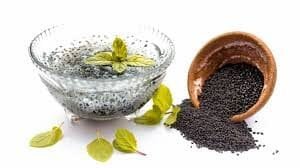Sabja Seeds: A Superfood with Many Benefits
Sabja seeds, also known as basil seeds or tukmaria, are a small, black seed that is native to India and Pakistan. They have been used for centuries in Ayurvedic medicine for their many health benefits.
Sabja seeds are a good source of fiber, protein, and vitamins A, C, and K. They are also a good source of omega-3 fatty acids, which are essential for good health.
They are popular in Southeast Asian cuisine and have been used for their health benefits in traditional medicine practices for centuries. Here are some of the potential health benefits of sabja seeds:
Health Benefits of Sabja Seeds
- Rich in Nutrients: Sabja seeds are packed with essential nutrients including fiber, protein, vitamins, and minerals such as calcium, magnesium, and iron. These nutrients are important for overall health and well-being.
- Digestive Health: Sabja seeds contain dietary fiber which can aid in digestion by promoting bowel regularity and preventing constipation. The mucilage present in the seeds also helps to soothe the digestive tract. Sabja seeds are a good source of fiber, which can help improve digestion. Fiber can help to bulk up stool and make it easier to pass. Sabja seeds can also help to relieve constipation and bloating.
- Weight Management: The high fiber content in sabja seeds can help promote feelings of fullness, which may reduce overall calorie intake and support weight management efforts. Sabja seeds are a good source of fiber, which can help you feel full and satisfied after eating. This can help you eat fewer calories and lose weight.
- Hydration: When soaked in water, sabja seeds form a gel-like substance due to their mucilage content. This gel can help keep the body hydrated, making it a refreshing drink especially during hot weather.
- Blood Sugar Control: Some studies suggest that sabja seeds may have a positive impact on blood sugar levels. The fiber content in the seeds can slow down the absorption of sugar into the bloodstream, which may help stabilize blood sugar levels. Sabja seeds contain soluble fiber, which can help slow down the absorption of sugar into the bloodstream. This can help improve blood sugar control in people with diabetes.
- Heart Health: Sabja seeds contain compounds like alpha-linolenic acid (ALA), which is a type of omega-3 fatty acid that may have heart-protective effects. Additionally, the fiber and other nutrients in sabja seeds may help lower cholesterol levels, thereby reducing the risk of heart disease. Sabja seeds are a good source of omega-3 fatty acids, which are known to be beneficial for heart health. Omega-3 fatty acids can help reduce inflammation, improve cholesterol levels, and lower the risk of heart disease.
- Antioxidant Properties: Sabja seeds contain antioxidants that help neutralize harmful free radicals in the body, which can reduce the risk of chronic diseases and support overall health.
- Anti-inflammatory Effects: Some research suggests that sabja seeds may have anti-inflammatory properties, which can help reduce inflammation in the body and alleviate symptoms of inflammatory conditions.
- Immunity: Sabja seeds are a good source of vitamins A and C, which are antioxidants that can help boost the immune system. Antioxidants help protect the body from damage caused by free radicals, which can lead to diseases such as cancer and heart disease.
- Other benefits: Sabja seeds have also been shown to have other benefits, such as reducing stress, improving sleep, and relieving headaches.
It’s important to note that while sabja seeds offer many potential health benefits, more research is needed to fully understand their effects on human health. Additionally, individuals with certain medical conditions or allergies should consult with a healthcare professional before incorporating sabja seeds into their diet.
How to Use Sabja Seeds
Sabja seeds can be used in a variety of ways. They can be soaked in water and added to drinks, such as smoothies, milkshakes, and lassi. They can also be added to food, such as salads, curries, and desserts.
Side Effects of Sabja Seeds
Sabja seeds are generally safe for most people to consume. However, they may cause some side effects in some people, such as diarrhea, nausea, and vomiting. If you experience any side effects after consuming sabja seeds, stop using them and consult with your doctor.
Conclusion
Sabja seeds are a healthy and versatile food that can be enjoyed by people of all ages. They are a good source of fiber, protein, vitamins, and minerals. Sabja seeds have also been shown to have a number of health benefits, such as weight loss, blood sugar control, heart health, digestion, immunity, and stress relief. If you are looking for a healthy and delicious way to improve your health, consider adding sabja seeds to your diet.
Thanks for visiting Gymbag4u.com
You may also love reading following health articles The Benefits of Pumpkin Seeds – GymBag4U and Flax seed consumption health benefits and side effects – (gymbag4u.com) and Chia seeds benefit and side effects to health – (gymbag4u.com)
